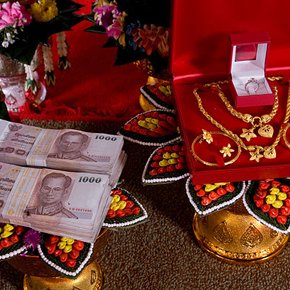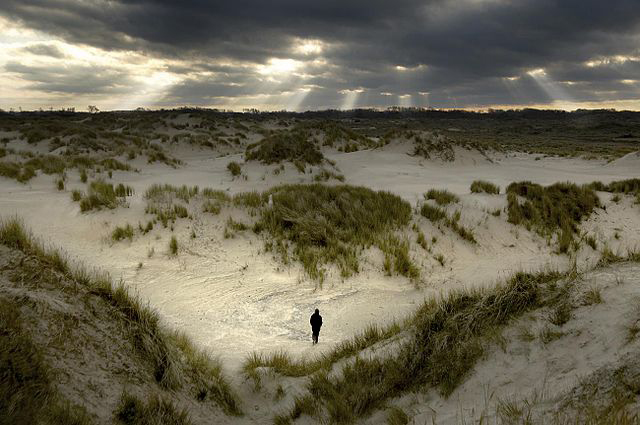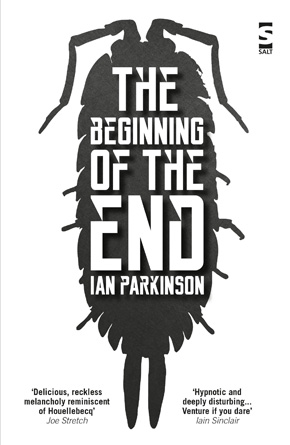Strays and loners
by Ian Parkinson The temple garden was beautiful, bright flowering trees and shrubs hidden from the noise of the traffic. We stood holding hands by a Buddhist statue while a local government official read something from a piece of paper. We promised to love one another, to live in harmony until death, caring for one another in times of sickness. After the vows, the official congratulated us and said that I could kiss the bride.
The temple garden was beautiful, bright flowering trees and shrubs hidden from the noise of the traffic. We stood holding hands by a Buddhist statue while a local government official read something from a piece of paper. We promised to love one another, to live in harmony until death, caring for one another in times of sickness. After the vows, the official congratulated us and said that I could kiss the bride.
The man from the marriage agency had come to take some photographs of the ceremony. He told us to stand in front of a tree that had pink flowers dangling from its branches. Joy wrapped her hands around my arm, hugging me to her body. When the man from the agency had finished taking photographs, we left the temple garden and shook hands with him. The government official had already left.
“What now?” I asked.
Joy laughed at me. “I don’t know. Should we go for a walk along the beach?”
“Why not.”
We crossed the beach road and walked across the sand to the edge of the sea.
“Maybe I should come and live here,” I said. “In Thailand.”
Joy smiled. “But what about your friends and family?”
“I don’t really have any friends or family. I sometimes meet up with a colleague after work, but I don’t really know much about him. I’ve never met his wife or been to his house.”
We made our way over to one of the beach bars and ordered two bottles of Beer Thai. I felt as though I should celebrate my second marriage. Maybe I could buy myself one of the white coral necklaces I’d seen for sale on the tourist stalls.
“Should we go for a swim in the sea?”’ I asked.
“I don’t want to get my hair wet. But you can if you want to. I’ll stay here and watch.”
“I suppose I don’t feel like it either.”
I smoked a cigarette in silence. I wanted to lie on my sofa in front of the television and catch up on the programmes I’d missed. I was looking forward to going to my favourite takeaway for a pizza and fries with mayonnaise and chilli sauce. In fact, it was going to be a little strange without Vincent around, at least until Joy moved in. I was used to having him around, even if I didn’t like taking him for walks.
“What are you thinking about?” Joy asked.
“Nothing.”
“I thought that you might be thinking about your father…”
“No. I was just thinking that it’ll be a little strange without Vincent.”
Joy looked down at the table top, running her finger over a crack in the plastic. “Poor Vincent. It makes me sad. You should go and ask for him back. I’ve told you that I’ll take him for walks if you don’t want to.”
“It’s impossible to ask for him back. I’m not allowed to have pets in my apartment.”
I smiled and shrugged my shoulders. Hopefully I would be able to find something to watch on the television in my hotel room. I finished my bottle of Beer Thai and looked across the beach. The temperature had lowered and a wind had started to rattle the metal roofs of the beach bars, whipping at the leaves of the palm trees.
The darkening sky had turned the sea a dull grey and the beach had started to empty as the first flash of lightning forked across the sky, illuminating the coast and followed almost immediately by a crack of thunder that rumbled through the streets. Somewhere nearby, a car alarm started to blare, the noise muffled by the heavy rain clattering against the corrugated tin roof above our heads.
“Maybe we should go back to the hotel,” Joy said.
I edged sideways in my plastic chair away from the drops of rain that had started to leak through the tin roof. This time the lightning was closer, somewhere out of sight, a bright blue light flickering across the beach like a broken neon bulb. Someone was laughing and screaming. I looked at the sea and waited for the thunder.
…
 My father’s body had been found in an isolated villa on the coast. A long brown stain was visible on the living room floor. I found myself standing in it as I flicked through the channels on his old television, the soles of my shoes sticking to where my father’s head had lain for months, presuming that he’d fallen towards the telephone.
My father’s body had been found in an isolated villa on the coast. A long brown stain was visible on the living room floor. I found myself standing in it as I flicked through the channels on his old television, the soles of my shoes sticking to where my father’s head had lain for months, presuming that he’d fallen towards the telephone.
No one had bothered to contact a specialist cleaning company. There wasn’t much to clear from the villa. He’d lived there for less than a year and he clearly hadn’t been planning on proving his oncologist’s prognosis wrong. His possessions lay unpacked in boxes in one of the bedrooms upstairs. In the living room there was only a single chair – a green, rather ugly and badly worn leather armchair – and the old television on a stand in the corner. All the rest of the rooms were as sparsely furnished as the living room. A bare single mattress half covered with dirty blankets lay on the floor in the bedroom where he slept. In another bedroom, a wicker chair sat facing a window that overlooked the beach and the sea, the only piece of furniture in the room.
The last bottle of milk that my father had bought was still in the door of the refrigerator, the liquid separated into layers like sedimentary rock. Every time I looked at it, I pictured his body after three months of putrefaction. When I’d returned from Thailand, I’d been called to identify the body. I’d always presumed that he’d had another family. He’d been living with a woman for years, but things had clearly ended between them. The body would be lying on a steel tray in the morgue, covered by a sheet. It reminded me of a detective series on television. In a way I knew what to expect, even if the camera would usually cut away at the point where the sheet was pulled back to reveal the murder victim’s face. The staff would have tried their best to clean him up a little. I couldn’t help but wonder whether they’d had to pick the maggots from his corpse. But in the end I’d only been asked to identify him by the few possessions found with his body. His features had decomposed beyond recognition. In some cases a DNA test would have been required, but the detective seemed happy with things.
Alone in the moving domes of sand, the villa was at risk of being buried long before the sea came to lap at the door. But I suppose a year was as distant as a century to a man with less than six months to live.”
My father’s move to the villa in the dunes seemed like a macabre joke that he’d decided to play on himself. A geological survey commissioned by the relevant authorities had concluded that the building’s structure would begin to be exposed to the tides within one to two years. I’d found the report in a pile of unopened letters and electricity bills on the floor in the empty dining room. The words ‘one to two years’ had been underlined in an otherwise obscure paragraph.
Further along the coast, whole properties were being washed into the sea, their foundations slowly undermined by the waves. After every storm another house would be closer to collapsing on to the beach below as the loamy cliffs melted into the water. The villa’s owner must have been delighted to find a buyer. The perimeter wall had been almost completely submerged by a dune. Alone in the moving domes of sand, the villa was at risk of being buried long before the sea came to lap at the door. But I supposed that it made no difference. A year was as distant as a century to a man with less than six months to live.
I stood with a cup of coffee at the sliding doors in the living room as the cleaning fluid I’d bought dissolved the stain that had leaked through the carpet to the wooden floorboards. What must once have been the garden was now an inclined expanse of sand enclosed by three white walls. Marram grass blew on the tops of the dunes beyond. The sea wasn’t far away. I could hear it through the open doors.
It was a pity that Joy couldn’t come to the funeral. Although my mother hadn’t attended, I would have liked to have introduced her to my relatives. I hadn’t seen any of them since I was a child. My aunts and uncles were getting old. Even my cousins were getting old. I couldn’t help but stare at the wrinkles that had appeared around their eyes and mouths. A few of them had clearly had cosmetic surgery of one kind or another. After the burial, we went for a drink and I sat and listened to them reminisce about their childhoods with my father. Their stories didn’t take long to peter out. Everyone was keen to get going. It had been a long drive and we wanted to miss the traffic on the way home.
I didn’t bother to tell anyone about Joy. Some of the mourners knew that I’d been on holiday in Thailand at the time of my father’s death. They asked me what it had been like and whether I’d enjoyed myself. Beyond that there wasn’t much to say. No one knew why my father had decided to move into the villa. No one had ever visited him there.
Extracted from The Beginning of the End.
Ian Parkinson was born in Lancashire in 1978 and studied philosophy at university before working as a civil servant and insurance clerk. The Beginning of the End, his debut novel, is published in paperback by Salt. Read more.
WRITERS’ PATHS
‘Going deeper’ by Ian Parkinson


